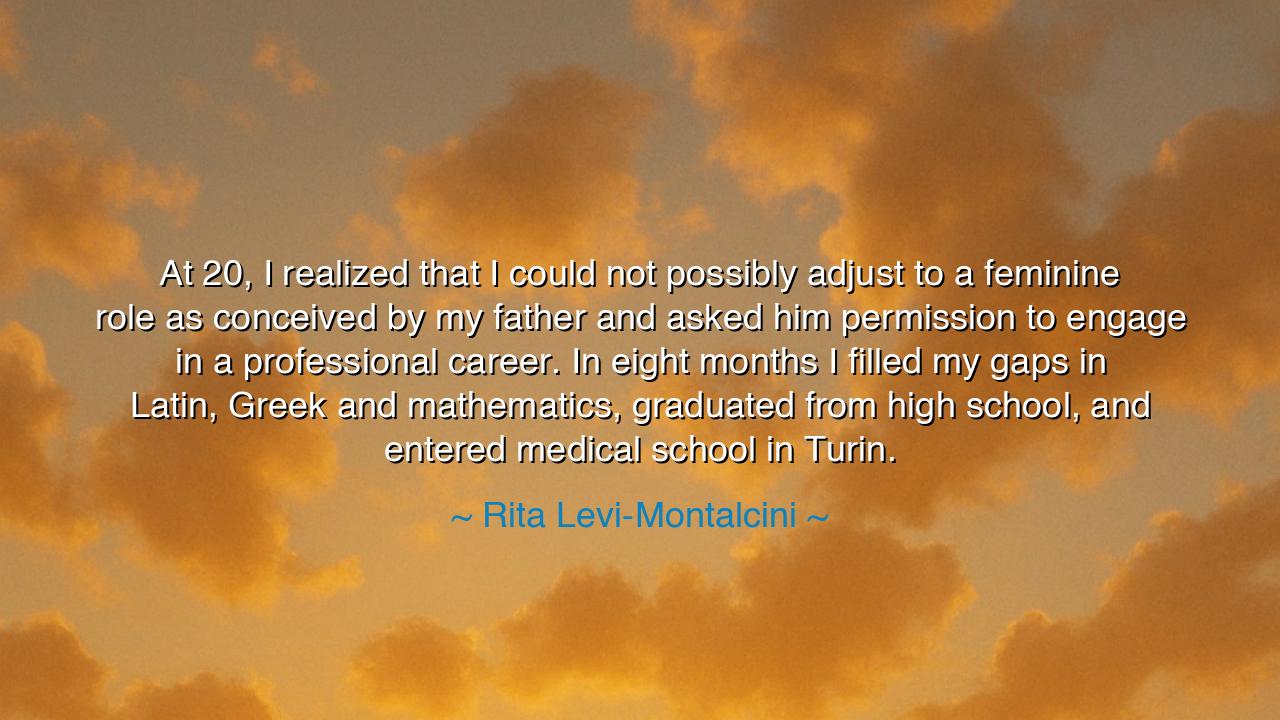
At 20, I realized that I could not possibly adjust to a feminine
At 20, I realized that I could not possibly adjust to a feminine role as conceived by my father and asked him permission to engage in a professional career. In eight months I filled my gaps in Latin, Greek and mathematics, graduated from high school, and entered medical school in Turin.






The words of Rita Levi-Montalcini — “At 20, I realized that I could not possibly adjust to a feminine role as conceived by my father and asked him permission to engage in a professional career. In eight months I filled my gaps in Latin, Greek and mathematics, graduated from high school, and entered medical school in Turin.” — resound like a hymn to courage, intellect, and self-determination. Beneath their modest tone burns the fierce light of defiance — the quiet rebellion of a mind unwilling to be confined by the customs of its time. These words are not merely autobiographical; they are a declaration of independence, an anthem for every soul who has refused to live smaller than their spirit demands.
When Rita Levi-Montalcini spoke these words, she was recalling the dawn of her own awakening. Born in Italy in 1909, into a world where women were expected to obey, to marry, and to remain in the shadow of men, she faced the heavy weight of tradition. Her father, a conservative engineer, believed that women should not pursue higher education, for it would distract them from their “true purpose” — the home. But in her, there burned a deeper hunger: the desire to know, to understand the mysteries of life itself. At twenty, she stood before the walls built by custom and decided to climb them. With discipline as her ladder and courage as her light, she set forth to reclaim her destiny.
Her determination was nothing short of heroic. In eight months, she mastered subjects that others studied for years — Latin, Greek, and mathematics — not to prove herself to others, but to open the gates of learning for herself. She entered medical school in Turin, where few women had ever gone before. There, her path would lead her to the study of the human nervous system, and in time, to discoveries so profound that she would one day earn the Nobel Prize in Physiology or Medicine. Yet her words remind us that greatness does not begin in laboratories or accolades — it begins in a single act of refusal. It begins when a person looks upon the limits imposed upon them and says, “No — I will not be defined by them.”
The ancients would have recognized in her spirit the mark of the hero’s journey — not one of sword and shield, but of intellect and perseverance. Like Hypatia of Alexandria, the philosopher who taught astronomy and mathematics in a male-dominated world, Levi-Montalcini faced not only the challenges of study, but the prejudice of society. Yet both women shared the same inner strength: the conviction that truth and wisdom are genderless, belonging to all who seek them. To walk the scholar’s path as a woman in such an age was to walk through fire. But as the blacksmith tempers steel in flame, so too was her resolve strengthened by struggle.
Her rebellion was not one of anger, but of purpose. She did not despise her father, nor the traditions that bound her — she transcended them. When she asked for his permission to pursue a professional career, it was not submission, but strategy. She understood that defiance alone changes nothing; it must be joined with wisdom, patience, and action. And so, rather than fight to destroy the world she was born into, she quietly built a new one within it — a world where a woman’s mind could flourish freely. In this, she teaches us that revolution need not always roar; sometimes, it whispers through the steady labor of the devoted heart.
There is also great symbolic meaning in her mastery of Latin and Greek — the ancient languages of knowledge, philosophy, and reason. It is as though she reached backward into history to draw strength from the wisdom of those who came before her. For she knew that true education is not simply the memorization of facts, but the inheritance of civilization’s deepest ideas. Her rapid ascent from ignorance to mastery is not only a triumph of intellect, but a spiritual rebirth — the transformation of one bound by expectation into one liberated by learning.
So let this be the teaching for all who listen: the path to freedom begins in the mind. Do not let others define what is possible for you. Whether your barriers are tradition, fear, or the doubt of others, remember that you possess within you the same power that moved Levi-Montalcini — the power to learn, to rise, to become. Fill your own gaps, as she did, not for approval, but for awakening. The world may try to shape you into its image, but only you can decide your form.
For in the end, Rita Levi-Montalcini’s words remind us that greatness is not bestowed; it is claimed — often quietly, through diligence and conviction. Her story is proof that the soul’s true purpose cannot be contained by convention. When she walked into medical school in Turin, she carried not only her books, but the hopes of every woman who had ever been told, “You cannot.” And through her, the world learned that intellect knows no gender, that courage has no age, and that the flame of purpose, once lit, can burn through even the thickest darkness.






AAdministratorAdministrator
Welcome, honored guests. Please leave a comment, we will respond soon